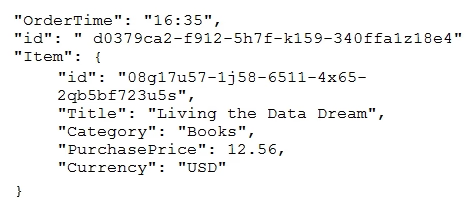Your company is an online retailer that can have more than 100 million orders during a 24-hour period, 95 percent of which are placed between 16:30 and 17:00.
All the orders are in US dollars. The current product line contains the following three item categories:
✑ Games with 15,123 items
✑ Books with 35,312 items
✑ Pens with 6,234 items
You are designing an Azure Cosmos DB data solution for a collection named Orders Collection. The following documents is a typical order in Orders Collection.

Orders Collection is expected to have a balanced read/write-intensive workload.
Which partition key provides the most efficient throughput?